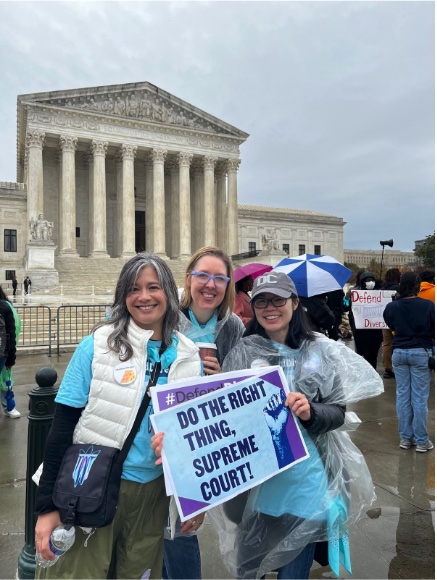Why I care about race-conscious admission (a.k.a. affirmative action)

Why I care about race-conscious admission (a.k.a. affirmative action)
Alyson Tom, Castilleja School
May 25, 2023
Growing Up
I remember what it’s like to be “the only one” in a classroom. Growing up in Texas, I was one of the only students of color in my elementary school and endured racist taunts from some of my classmates. Some memories are so vivid that I still feel sadness and hurt. Whenever I hear the claim that elementary school children are too young to talk about race, I shake my head. As an Asian American in a predominantly white environment, I never had the option to avoid thinking about race because it was clear from an early age that I didn’t fit in.
I was not the first or the last student of color to have challenging experiences, and I can only imagine how much worse it could have been if I were from an even more marginalized group. As I got older, I attended more diverse schools; the more diverse the school I attended, the fewer negative experiences I had in and out of the classroom. The best educational experience I’ve ever had was attending grad school at one of the most diverse universities in the country; no racial group was in the majority, and we learned so much from each other. I share my experiences to illustrate why I care so much about race-conscious admission. The importance of diversity is not theoretical to me.
SFFA v. Harvard/UNC
I started following the Harvard/UNC race-conscious admission cases because the plaintiff (Students for Fair Admission, Inc.) accused the schools of discriminating against Asian American students. The person in charge of SFFA, Inc. is a conservative activist who is against affirmative action. Though he claims to represent Asian Americans, he is not Asian American and is not truly advocating for us. He’s not advocating for Asian American affinity spaces, championing Asian American Studies programs, or encouraging anti-bias training for admission officers. Instead, he wants to end “ANY use of race or ethnicity in the EDUCATIONAL setting.” Think of the ramifications.
I do NOT believe that colleges are discriminating against Asian American (or white) students by using race-conscious admission. (In fact, Asian Americans can directly benefit from affirmative action, and there are colleges where Asian Americans are underrepresented and included in diversity fly-in opportunities.) To me, discrimination is an intentional act meant to hurt an individual or group. These colleges are using race-conscious admission to build diverse classes of students to benefit everyone. It’s also hard for me to believe that Asian Americans are being discriminated against at Harvard when they make up more than 25% of the undergraduate population, especially when we (Asian Americans) only make up about 6% of the entire US population. At colleges with single-digit admit rates, most applicants aren’t getting admitted no matter how brilliant or talented they are. It’s not discrimination; it’s math.
Speaking Up
I finally got fired up enough to start speaking publicly about race-conscious admission and my support for it when I co-presented at the 2017 NACAC National Conference (“Do Highly Selective Colleges Discriminate Against Asian Americans”—we emphatically said no). I realized that more Asian Americans needed to speak up in support of race-conscious admission to disrupt the narrative that all Asians are against it. SFFA, Inc. is pitting Asian American students against Black and Latinx students, and that’s not okay. We need to support each other, not tear each other down.
I’ve continued to speak about race-conscious admission over the years, and I’ve been fortunate to have the support of Castilleja to present to our students and external audiences on the topic. I want more people, especially students, to understand the purpose of race-conscious admission and the power and value of diversity. I’m also counting on the younger generations to change things for the better regardless of the Supreme Court’s decision this summer, especially if things go in the wrong direction.

(Pictured: Marie Bigham, Emmi Harward, Alyson Tom in front of the Supreme Court on October 31, 2022)
Understanding Race-Conscious Admission
If you’d like to start educating others, here are some talking points I’ve shared with students and adults. Race-conscious admission:
Allows admission offices to consider race/ethnicity as one factor among many. In a race-conscious holistic review process, the admission readers are aware of an applicant’s race, but race will not be the sole reason a student is or is not admitted. Race gets a lot of attention, but it’s only one piece of a larger puzzle.
Provides students with the educational benefits of diverse learning environments. Race-conscious admissions policies are necessary to achieve the educational benefits of diverse learning environments. A large body of research shows that all students benefit from being in classes with people from different backgrounds and life experiences. (There’s also research that shows diverse companies make more money.)
Helps prevent racially isolated learning environments. Just having one of each race or ethnicity is not enough. Having a critical mass to avoid students being the “only one” helps prevent racially isolated learning environments and improves college retention rates.
Does NOT mean admitting unqualified applicants. Race-conscious admission doesn’t mean that colleges are admitting unqualified applicants. That’s a myth, so don’t second guess why someone got in or speak poorly of them. The number one application component that colleges care most about is a student’s high school transcript and academic history. The primary question colleges consider is, “Can this student do the work required to graduate from our college?”
Advising Asian American Students
Asian Americans are not a monolith, so it’s important not to make generalizations about who students are or how they feel. Some Asian American students are understandably concerned about the cases. Some very much support race-conscious admission, while others don’t. In this period of intensified anti-Asian racism, some are worried about attacks based on the color of their skin. Acknowledging their fears is important—your Asian American students may have experienced racism or microaggressions. It’s also critical to assure Asian students (really, all students) that they should be unapologetically themselves as they apply to college.
Don’t feed into SFFA’s narrative. Advising a student to appear “less Asian” or intentionally hide parts of their identity in the application process is unethical and damaging to the student, even if they seem to agree with you. What are we teaching our students if we tell them that who they are is not okay? Lying is the way to get ahead? Being Asian is wrong? I spent most of my childhood wishing I were white so that I could fit in—it’s an awful feeling to have. Help your students to appreciate who they are.
What You Can Do
If you’re wondering what you can do to help, here are some suggestions:
-
Educate yourself on race-conscious admission and the Harvard/UNC Supreme Court cases.
-
Supporting College Access and Diversity (American Council on Education)
-
Educate your family and friends on race-conscious admission.
-
Educate your school community on race-conscious admission. Examples include speaking to your juniors/seniors and/or presenting at a faculty meeting, an all-school meeting, or a parent night.
-
Host a national webinar on race-conscious admission and invite a wide audience.
-
Prepare for your office’s response in anticipation of the Supreme Court’s decision this summer.
-
NACAC Tools: U.S. Supreme Court Cases Involving Race-Conscious Admission
-
College Board: U.S. Supreme Court Ruling on Race in Admissions: Prepare Now for the 2023 Ruling
-
Encourage your head of school to prepare a response.
-
Write a blog/essay/op-ed in support of race-conscious admission.
-
Donate money or time to an advocacy group that supports race-conscious admission.
Final Thoughts
An application review process that doesn’t allow for the consideration of one’s identity prevents students from being seen fully. To quote Dr. OiYan Poon, a scholar and expert on race-conscious admission: race-conscious admission is “practiced through HOLISTIC REVIEW, which allows for the consideration of each individual applicant as a whole person with unique profiles, acknowledging that race is embedded into social lives.”
There’s a narrative that Asian Americans are against race-conscious admission, but we are not a monolith. In fact, nearly 70% of Asian Americans support affirmative action, although there is a vocal minority that might make you think otherwise. I support race-conscious admission because I support diversity, and I believe that all students should be able to bring their whole selves to the college application process.

This is fantastic, Alyson! Thank you for sharing your perspective, wisdom and valuable resources!